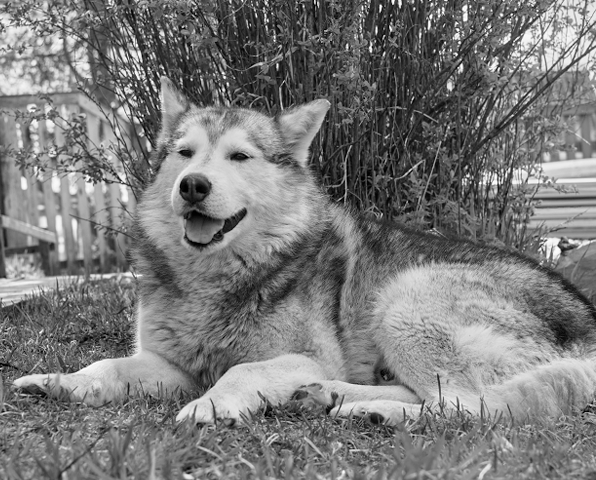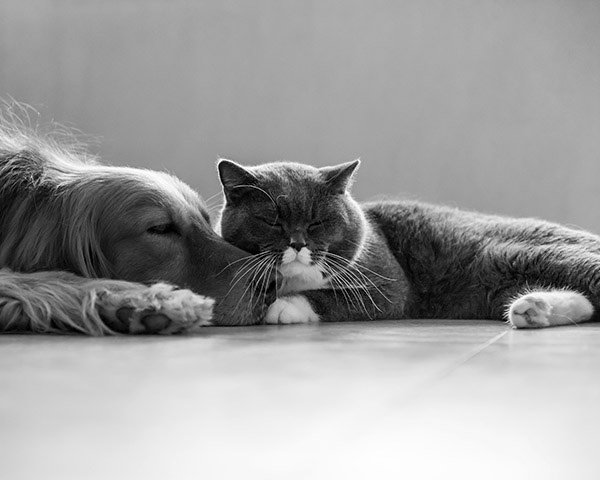Husky dog breed information and advice
The Siberian Husky is an instantly recognisable dog breed. Originally bred to pull sleds, their thick coats and boundless energy – paired with their love for their human companions – means they’re a popular choice for dog owners.
Huskies are intelligent and they thrive on human interaction, but they can be somewhat independent and stubborn, too. They need plenty of exercise and mental stimulation every day or they can become bored and turn to unwanted behaviours.
But their gentle, playful and friendly temperament means they can be excellent family dogs as long as they’re socialised and trained well from a young age. If you’re considering welcoming a husky into your family, this guide has all you need to know.
Husky facts

| Lifespan | 12 - 15 years |
| How much | £450 - £1500 |
| Size | 50 - 60 cm |
| Weight | 16 - 27 kg |
| Colours | White, black, grey, black & white, grey & white, black & tan, red & white, sable & white |
| Grooming | Brush once per week |
| Temperament | Friendly, playful, intelligent, gentle |
| Exercise | At least two hours per day |
Husky insurance
Huskies can be prone to developing certain health conditions, such as:
If you’re buying a husky puppy, be sure to choose a reputable breeder so they’re less likely to inherit genetic diseases. You should also make sure your Siberian Husky has had all the vet checks and vaccinations necessary before bringing them home. It’s a legal requirement for dogs to be microchipped in the UK, and your breeder should have arranged this before your dog comes home with you.
Register your pet with a local vet as soon as you can, and book regular check-ups while they grow to make sure they’re staying fit and healthy.
Pet insurance can help protect you financially if your husky needs treatment for unexpected illness or injury. It could cover the cost of vet bills, treatment, medication and surgery for your husky.
Sainsbury’s Bank Husky pet insurance for Huskies
With Sainsbury's Bank Pet Insurance, you can take out a dog insurance policy for your Husky from eight weeks old.
All insurance policies have restrictions. To find out more about our terms and conditions including exclusions, excesses and limits, please take a look at our policy documents.
How to care for a Husky
Exercising, training, feeding and grooming are all important when you own a husky. Here’s what you need to know:
Feeding and nutrition
Husky puppies are growing fast and need plenty of food, but their small stomachs mean they should only be fed small meals four a day. Reduce to once or twice a day for an adult dog. The daily amount to feed your dog will be on the food packaging, where you’ll also find the nutrient contents. Ask your vet if you are unsure of the best food for your dog.
Grooming
Huskies have a double coat: a layer of dense fur undercoat to keep them warm, and a second layer of longer hair which helps keep them dry and regulates their temperature.
You should brush your husky’s coat at least once a week to keep it in good condition. Use a wide-toothed comb to untangle any matting from the overcoat, followed by a paddle brush to remove loose hair from the undercoat.
Huskies moult twice a year. This process helps them shed their thick winter coat in spring, and regrow it again in autumn. You may find noticeably more dog hair around during moulting season. It’s best to brush them more regularly while they’re moulting to keep on top of the stray hair.
Exercise
Training
Huskies are intelligent dogs who form strong bonds with their owners, so training can be rewarding for both of you. But they do have an independent streak which can mean they’re more difficult to train than some breeds. For this reason, a husky might not be a good idea for first-time dog owners.
Patience and persistence is key for dog training. Regular, short training sessions will keep your dog motivated and interested. Always reward your husky for good behaviour, rather than punishing bad behaviour.
Temperament and behaviour
Huskies are loving, playful and intelligent dogs. They are friendly with people and children, and are sociable with other dogs providing they are well socialised as puppies.
However, huskies can be naughty and prone to destructive behaviour if they haven’t had enough physical or mental stimulation. They have been known to destroy furniture, dig up gardens and attack livestock. Their high prey drive means they’re best walked on the lead in public and rural areas. Keep off-lead time to enclosed spaces like designated dog parks or gardens.
Common Husky health problems
Hip dysplasia
Hip dysplasia is where the ball-and-socket joint of the hip doesn’t fit properly and the hip joint surface rubs together. An affected dog will have back leg weakness and lameness. The condition can affect one or both hips at the same time. It’s present from a young age when the bones are not fully developed.
Hip replacement surgery is an option for severe cases, but this is expensive and complex. Management at an early stage will mean fewer difficulties. Most pedigree dogs are x-rayed for the condition before breeding. By the time you get your puppy it will be too late to prevent hip dysplasia, so check with the breeder that the parents have been tested.
Epilepsy
Epilepsy is a neurological disorder that causes epileptic seizures. Siberian Huskies can be genetically predisposed to develop epilepsy. There are three types of epileptic seizures in dogs: reactive, primary and secondary. The most common type is primary – also known as idiopathic epilepsy.
Seizures usually begin between six months and three years old. Epilepsy in Huskies can be managed with medication. If your dog has a seizure, make sure there are no hard or sharp objects nearby which could cause injury. Contact your vet or an emergency out- of- hours clinic once the seizure ends.
Inflammatory bowel disease
Inflammatory Bowel Disease or IBD, is an immune disorder which is common in Huskies. The intestinal lining becomes thickened with immune cells, preventing the dog from properly absorbing nutrients. This can cause vomiting and diarrhoea. Medication or a special diet can help treat the condition.
Cancer
Huskies may be more prone to cancer as they age. Many types of cancer can be removed through surgery, or treated with chemotherapy. Early detection is critical, so be sure to take your husky for regular check-ups, where your vet will examine them for lumps and bumps.
Heart disease
Heart defects can affect a number of dog breeds, including Huskies. Most commonly the structure of the heart’s dividing wall is affected, but heart valve function and electrical signals controlling heartbeat can also be affected.
Your vet should check your Husky’s heartrate with a stethoscope during their checkups. You can also keep an eye out for symptoms like tiring easily, coughing, fainting or a swollen belly, which can be symptoms of heart problems.
Are huskies dangerous?
Huskies are friendly and gentle dogs if well-socialised and trained from a young age. Due to their size and wolf-like appearance, some people may be nervous around huskies, but they rarely show aggression towards people or other dogs. However, they do have a high prey drive and may attack cats, livestock or other small animals.
What’s a husky’s life span?
Huskies are a healthy breed that can live for 12-15 years if they are well cared for. Make sure they have plenty of exercise, a good diet and regular checkups with your vets to make sure your pet husky stays in tip-top condition.
Do huskies shed?
Huskies have dense, thick coats which do shed. Regular brushing and grooming can help keep dog hair around the house to a minimum.
Is a husky right for you?
Outgoing, friendly and sociable, a husky could make a fantastic pet for the right person. However, their need for plenty of exercise and tendency to be destructive if left alone for long periods means they might not be suitable for everyone.
Although they’re intelligent, huskies also have a stubborn streak which can make them more difficult to train than some breeds. For this reason, they’re best suited to experienced dog owners with active lifestyles who will be around for them most of the time.
Frequently asked questions
Is a husky a good family dog?
Yes, huskies can make excellent family dogs. They’re sociable, friendly and gentle, and they can be great with children if socialised well from a young age. However, they do require lots of exercise, so the family will need to consider if they have time for long walks every day.
Is a husky a friendly dog?
Huskies are very friendly dogs – to the point where they don’t make good guard dogs because they’re so pleased to greet everybody. They are happy and sociable with adults, children and other dogs alike.
Are huskies hard to take care of?
Huskies are friendly and intelligent dogs, but they do require a lot of exercise and grooming. They need at least two hours of exercise a day, and should be brushed at least once a week to keep their coats healthy.
Are huskies good protection dogs?
Although they may look a little intimidating thanks to their wolf-like appearance, Huskies don’t make good protection dogs. Their friendly personality means they’re more likely to welcome an intruder into your home with a wagging tail than aggression or warning barks.

Browse our guides
Choose from our list of helpful guides and information

Explore dog breeds
Find out how to keep your dog healthy and happy

Cat breed guides
How to care for your cat, common health problems and more
Terms and conditions
Important information
*Guaranteed discount for Nectar members: The discount is based on information related to you and the transactions you've made with Sainsbury's supermarkets and Sainsbury's Bank using your Nectar card. For more information go to sainsburysbank.co.uk/nectar.
Sainsbury's Bank plc, Registered Office, 33 Charterhouse Street, London, EC1M 6HA (registered in England and Wales, no 3279730) is authorised by the Prudential Regulation Authority and regulated by the Financial Conduct Authority and the Prudential Regulation Authority (register no. 184514).
Sainsbury's Supermarkets Ltd is an appointed representative of Sainsbury's Bank plc. Sainsbury's Bank plc acts as an introducer to Pinnacle Insurance Ltd who is authorised by the Prudential Regulation Authority and regulated by the Financial Conduct Authority and the Prudential Regulation Authority (register number 110866). Registered office: 4th Floor, Limelight, Elstree Way, Borehamwood, Hertfordshire, WD6 1JH. Sainsbury’s Bank Pet Insurance is arranged, administered and underwritten by Pinnacle Insurance Ltd. Sainsbury's Bank plc and Pinnacle Insurance Ltd are not part of the same corporate group.
We do not provide personal recommendations to customers.
